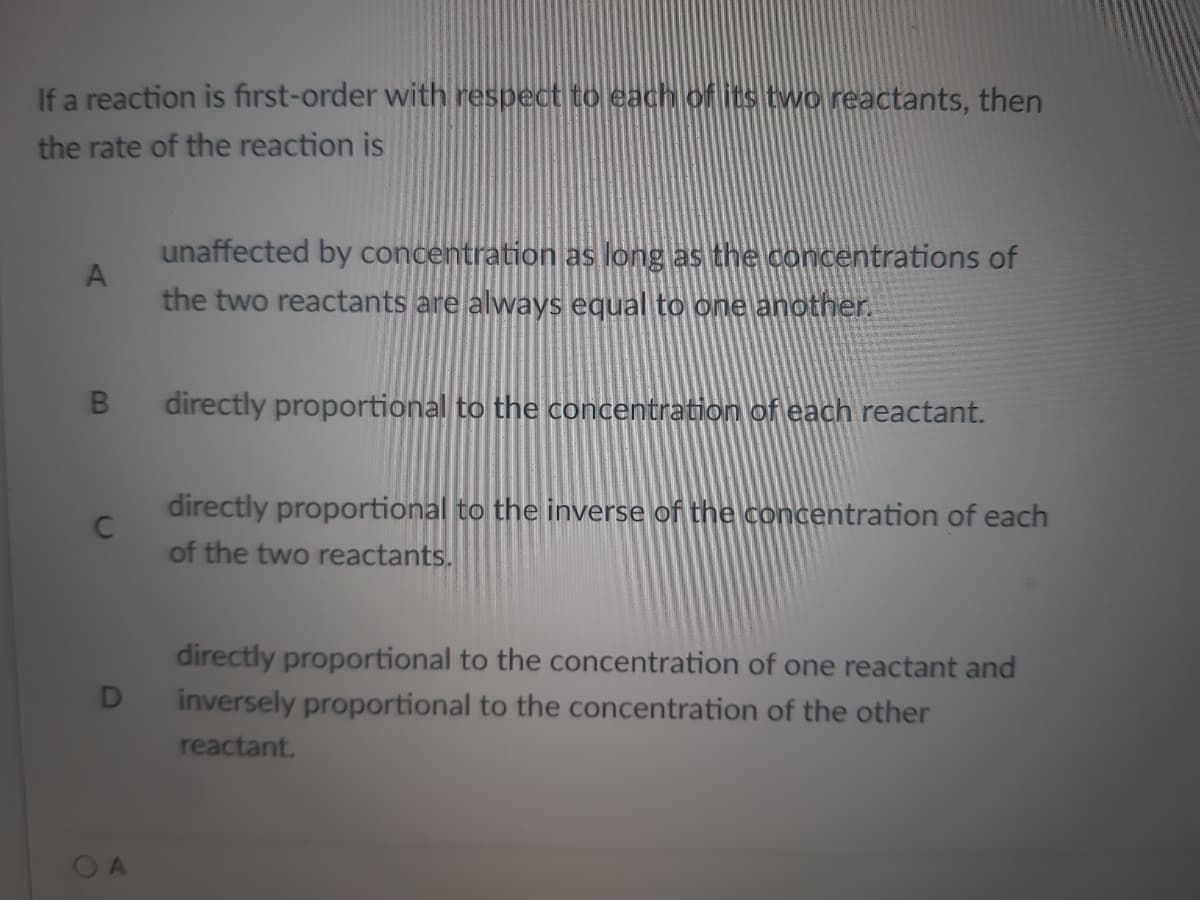If a reaction is first-order with respect to each of its two reactants, then the rate of the reaction is A unaffected by concentration as long as the concentrations of the two reactants are always equal to one another. B directly proportional to the concentration of each reactant. C directly proportional to the inverse of the concentration of each of the two reactants. directly proportional to the concentration of one reactant and inversely proportional to the concentration of the other D reactant.
If a reaction is first-order with respect to each of its two reactants, then the rate of the reaction is A unaffected by concentration as long as the concentrations of the two reactants are always equal to one another. B directly proportional to the concentration of each reactant. C directly proportional to the inverse of the concentration of each of the two reactants. directly proportional to the concentration of one reactant and inversely proportional to the concentration of the other D reactant.
Chemistry by OpenStax (2015-05-04)
1st Edition
ISBN:9781938168390
Author:Klaus Theopold, Richard H Langley, Paul Flowers, William R. Robinson, Mark Blaser
Publisher:Klaus Theopold, Richard H Langley, Paul Flowers, William R. Robinson, Mark Blaser
Chapter12: Kinetics
Section: Chapter Questions
Problem 14E: Tripling the concentration of a reactant increases the rate of a reaction nine times. With this...
Related questions
Question
Answer this.

Transcribed Image Text:If a reaction is first-order with respect to each of its two reactants, then
the rate of the reaction is
A
unaffected by concentration as long as the concentrations of
the two reactants are always equal to one another.
B
directly proportional to the concentration of each reactant.
C
directly proportional to the inverse of the concentration of each
of the two reactants.
directly proportional to the concentration of one reactant and
inversely proportional to the concentration of the other
reactant.
Expert Solution
This question has been solved!
Explore an expertly crafted, step-by-step solution for a thorough understanding of key concepts.
Step by step
Solved in 2 steps

Knowledge Booster
Learn more about
Need a deep-dive on the concept behind this application? Look no further. Learn more about this topic, chemistry and related others by exploring similar questions and additional content below.Recommended textbooks for you

Chemistry by OpenStax (2015-05-04)
Chemistry
ISBN:
9781938168390
Author:
Klaus Theopold, Richard H Langley, Paul Flowers, William R. Robinson, Mark Blaser
Publisher:
OpenStax

Chemistry: Principles and Practice
Chemistry
ISBN:
9780534420123
Author:
Daniel L. Reger, Scott R. Goode, David W. Ball, Edward Mercer
Publisher:
Cengage Learning

Chemistry & Chemical Reactivity
Chemistry
ISBN:
9781337399074
Author:
John C. Kotz, Paul M. Treichel, John Townsend, David Treichel
Publisher:
Cengage Learning

Chemistry by OpenStax (2015-05-04)
Chemistry
ISBN:
9781938168390
Author:
Klaus Theopold, Richard H Langley, Paul Flowers, William R. Robinson, Mark Blaser
Publisher:
OpenStax

Chemistry: Principles and Practice
Chemistry
ISBN:
9780534420123
Author:
Daniel L. Reger, Scott R. Goode, David W. Ball, Edward Mercer
Publisher:
Cengage Learning

Chemistry & Chemical Reactivity
Chemistry
ISBN:
9781337399074
Author:
John C. Kotz, Paul M. Treichel, John Townsend, David Treichel
Publisher:
Cengage Learning

Chemistry: Principles and Reactions
Chemistry
ISBN:
9781305079373
Author:
William L. Masterton, Cecile N. Hurley
Publisher:
Cengage Learning

Physical Chemistry
Chemistry
ISBN:
9781133958437
Author:
Ball, David W. (david Warren), BAER, Tomas
Publisher:
Wadsworth Cengage Learning,
